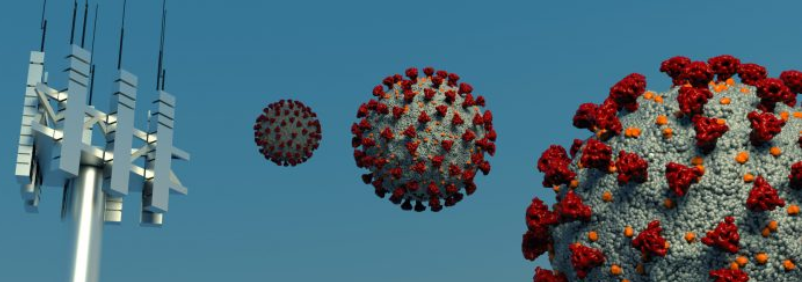As 5G masts roll out in big cities around the world, there has been a noticeable uptick in the number of posts circulating the internet about 5G health concerns and conspiracy theories. Although it is tempting to dismiss the claims as nonsense, there comes a point when anyone in a position to speak must try to bring clarity to the subject and help reduce the misinformation and panic.
Telecoms.com recently published an article by Ethernity CEO David Levi called Debunking 5G Health Concerns which goes into many of the misconceptions, explains why 5G is not something to worry about, and backs these statements with facts from both scientific and authoritative organizations.
Debunking 5G Health Concerns
To summarize, there are three angles to examine these concerns in order to ascertain their validity:
- Physical Theory
- Medical Research
- Governing and Regulatory Bodies
Physical Theory
When trying to determine if cell phones or 5G can be a threat, the first thing to consider is how they interact with the human body. All radio waves and any proposed new bands for 5G are well within the non-ionizing portion of electromagnetic (EM) waves. As opposed to ionizing radiation, such as x-rays and some ultraviolet, which can cause cancer, non-ionizing EM waves are not dangerous.
Based on our current understanding of physics and medicine, there is no way for non-ionizing EM radiation to affect people other than by heat transfer. Regulations of maximum exposure to radio frequency radiation (RFR) make sure to take a large factor of error to the minimum exposure that could cause any harm through heat.
Medical Research
The physical theory notwithstanding, there is always a small chance that some new unexplained phenomenon could do us harm. There is no particular reason to suppose that RFR could cause harm, but since so many people use cell phones on a day-to-day basis, it would be prudent to conduct medical research. This could show us whether there is a statistically significant side effect (e.g., cancer) to using cell phones or being exposed to 5G.
Many such studies have been conducted, and in the majority of large, well-executed studies, no link was found between cell phones or RFR and increased incidence of cancer. Any studies that do appear to show such a link usually contain one or more of the following issues:
- The study shows correlation, not causation.
- The study is not statistically significant, and/or uses cherry-picked data.
- The study’s findings are flawed due to recall bias.
- The study used a much higher dose of RFR than is allowed or used by cellular technology.
It is difficult for non-experts to look at each study and determine its validity. The United States National Cancer Institute is a good impartial source, as they are not “for” or “against” cell phones; they just want to educate about and prevent cancer. This is their summary of the research:
“Researchers have carried out several types of epidemiologic studies in humans to investigate the possibility of a relationship between cell phone use and the risk of malignant and benign brain tumors […] These studies have not shown clear evidence of a relationship between cell phone use and cancer.”
Other impartial health and regulatory bodies with statements to the effect of “there is no scientific evidence to date that links cell phone use with any health risks” include:
- The World Health Organization (WHO)
- The American Cancer Society (ACS)
- National Institute of Environmental Health Sciences (NIEHS)
- United States Food and Drug Administration (FDA)
- United States Centers for Disease Control and Prevention (CDC)
- United States Federal Communications Commission (FCC)
- International Commission on Non-Ionizing Radiation Protection (ICNIRP) (in accordance with their 2020 Emission Guidelines)
- United Kingdom Office of Communications (OFCOM), which also has a page about the myths connecting 5G to COVID-19
Damage Resulting from 5G Misinformation
Some of these negative theories have gained widespread acceptance and caused real-world harm, including damage to 5G infrastructure, as well as threats to 5G (and legacy networks) technicians. There is also a risk that 5G rollout could be slowed or canceled due to the protestors. Many applications are waiting to be enabled by 5G technology, such as municipal services (including emergency), remote surgery and medical monitoring, internet of things (IoT), and Industry 4.0 automation. The surge of employees working from home during COVID-19 (which might continue after the virus) also requires faster, more robust communications infrastructure.
Conclusion
Misinformation related to 5G can seem insidiously scientific, making it difficult to know what to believe. Logical fallacies and echo chambers serve to reinforce people’s beliefs that 5G is a hazard to their health. After examining the science behind 5G, the medical research, and statements from impartial authoritative organizations, it is quite clear that the hype surrounding 5G dangers is simply unfounded. As the CDC put it:
“At this time we do not have the science to link health problems to cell phone use.”
Free speech and scientific discourse are important, but misinformation about 5G can seem scientific and therefore legitimate, making it difficult for laypeople to know what to believe. This can lead to economic setbacks, such as delays on rolling out 5G, as well as property damage such as the arson attacks in the United Kingdom. Most disheartening perhaps is that it pits people against 5G (and even 4G) technicians, who are providing essential services to a communications infrastructure that is under greater burden than it has even been before.

By Brian Klaff


